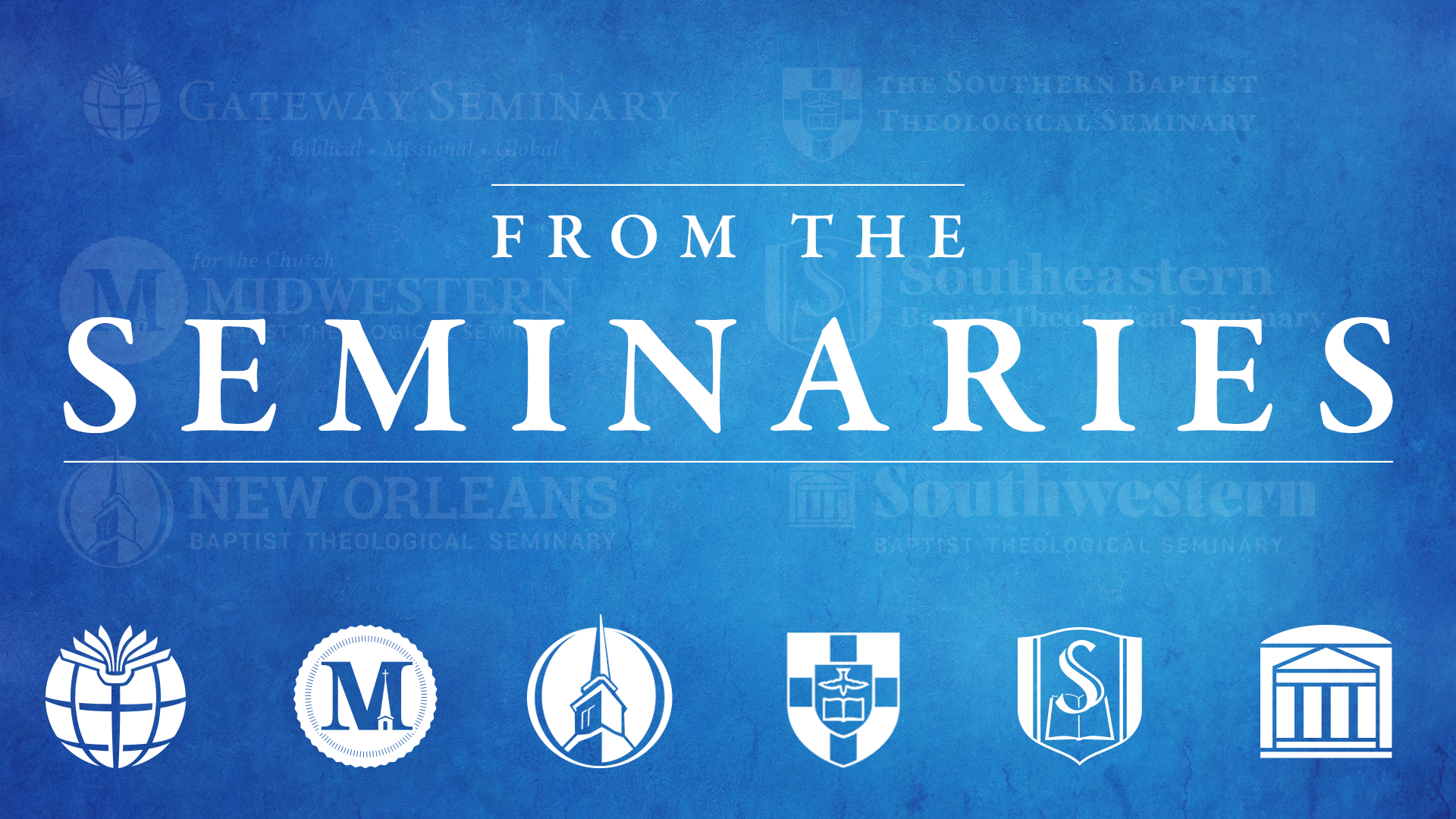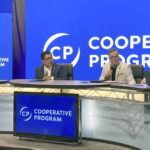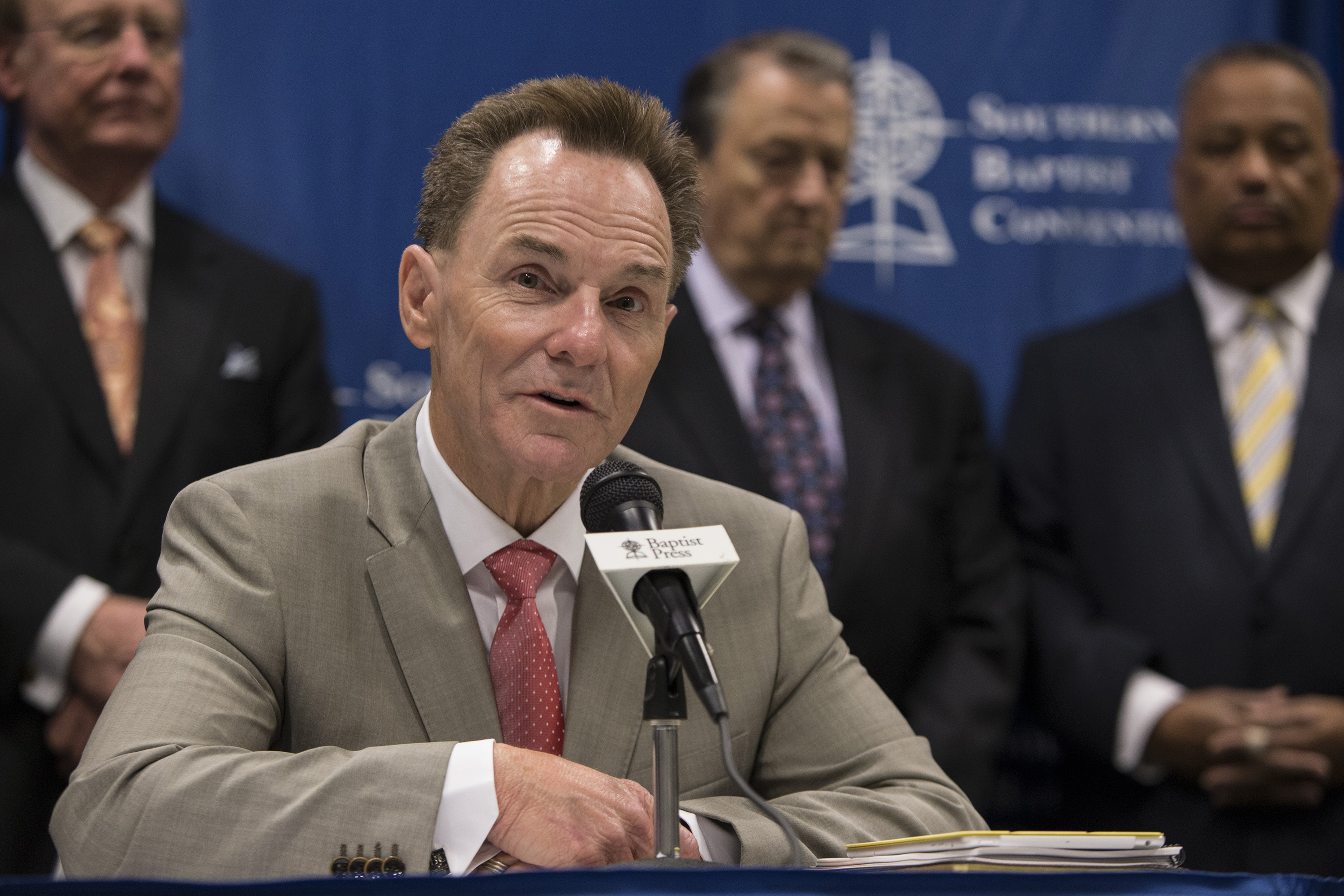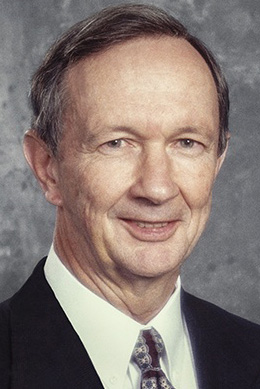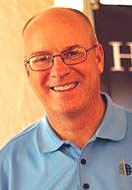
NOBTS/Leavell College fostering community from a distance
By Gary D. Myers
NEW ORLEANS (BP) — Safety and academic success were the top concerns addressed in the initial response of New Orleans Baptist Theological Seminary and Leavell College to the COVID-19 pandemic. Soon, maintaining community connections and spiritual health from a distance became a priority.
After initial hope that the alternative delivery methods would be temporary, state and local officials began calling for stricter social distancing measures. As a result, NOBTS and Leavell College leaders began looking for ways to foster community and growth while maintaining physical separation. Students and faculty members have responded with their own grassroots efforts to maintain connections.
Daily updates from Dew
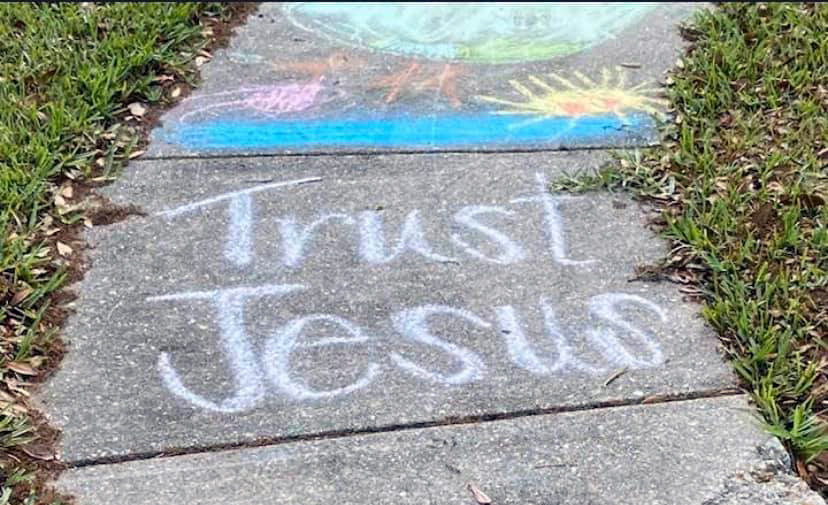 The most vital connection point for the seminary family has been the daily video update featuring NOBTS/Leavell College president Jamie Dew. Dew has been recording and posting the updates every weekday for the campus community since March 16. In addition to providing vital information for students, faculty and staff, Dew has used the videos to encourage the NOBTS family with scripture readings and devotions.
The most vital connection point for the seminary family has been the daily video update featuring NOBTS/Leavell College president Jamie Dew. Dew has been recording and posting the updates every weekday for the campus community since March 16. In addition to providing vital information for students, faculty and staff, Dew has used the videos to encourage the NOBTS family with scripture readings and devotions.
In recent days, the videos have addressed emergency financial needs of students, job search information and tips for maintaining emotional and spiritual health during this time of isolation. Dew and his wife Tara also posted an update with ways to help families cope with the challenges of COVID-19. For less campus-specific updates and encouragement, Dew is posting new episodes on his “Towel and Basin” podcast.
Community from a distance
With the stay-at-home order in New Orleans extended until at least April 30, additional campus connection efforts have developed — both official and grassroots.
The Student Life Office and the cafeteria launched the idea of a “social distancing picnic” on March 26. The cafeteria cooked hamburgers and the student life staff created a safe “grab-and-go” distribution method. Families were encouraged to pick up their food, return to their residential area and eat their picnic in the green spaces near their apartments while maintaining a safe physical distance from others. Faculty families enjoyed their picnics in their front yards. The picnic gave seminary families much-needed opportunities to chat with others while staying safe. On April 2, the cafeteria and student life offered the seminary’s famous red beans and rice as a takeout meal and encouraged the seminary family to eat outside again.
To break the monotony of the stay-at-home order, many have been sharing activity ideas via the seminary’s campus life Facebook group. After a few families began creating chalk drawings on campus sideways near their residences, the idea quickly spread throughout campus. While some drawings were abstract and simple, many were elaborate and most included messages of hope from scripture. Mothers who live on campus also have been sharing child-friendly and family activity ideas through the Facebook group. One of the most frequent contributors in the group has been Tara Dew, the president’s wife. She has shared multiple indoor and outdoor ideas for homeschoolers that can be done while maintaining social distance, as well as a number of ideas designed to foster family spiritual growth during this unique time.
Online devotions, encouragement and connection
On March 24 (normally a chapel day), the school posted an encouragement update from the scheduled chapel speaker — Dustin Turner, pastor of Vintage Church in New Orleans. NOBTS/Leavell College has requested similar videos from each scheduled chapel speaker. These will be posted in order to help students maintain spiritual health during the time of isolation.
To hear directly from students and to understand their needs, Dew scheduled a video prayer meeting using BlueJeans software during the scheduled chapel time on April 2. More than 70 students participated in the first session and were able to discuss their needs with Dew. Many of the students expressed growing financial challenges as well as concerns for friends and extended family members who have been diagnosed with the virus.
Ministry was another chief prayer concern. Many of the students serve as pastors or ministers in local churches and have seen their roles expand during the pandemic. Several students asked for prayers for wisdom and strength regarding their response to the needs of their congregations. One participant, a licensed counselor, offered to assist any of the students who are in need of counseling related to this time of stress and isolation. Based on the initial response to the meeting and the number of needs expressed, Dew said plans are underway for additional student video prayer meetings in the coming weeks.
Women’s ministry leaders and faculty wives have also used social media to encourage student wives and women students during this time of isolation. Each day a women’s ministry leader posts an encouraging video in the campus life Facebook group to foster community and spiritual health from a distance.
Virtual counseling
During his April 1 video update, Dew announced that the Leeke Magee Christian Counseling Center on campus will soon launch virtual counseling options for students and other members of the seminary community. Due to state and local stay-at-home orders, the center closed for face-to-face counseling sessions in mid-March. Dew said the staff has worked diligently to create a virtual counseling model which will begin in the near future.
**********
SWBTS church revitalization conference goes online
By Alex Sibley and Katie Coleman
FORT WORTH, Texas (BP) — With nearly 80 percent of churches in the Southern Baptist Convention plateaued or declining, church revitalization is a necessary ministry, said Kenneth Priest, interim director of the Center for Church Revitalization at The Southwestern Baptist Theological Seminary.
Addressing pastors during the Church Revitalization Conference, which was held fully online April 1, Priest said that in light of the importance of such a ministry, the conference aimed to help pastors answer the question, “Are you doing all that you can do to reach the nations where God has planted you for the purpose of advancing the Gospel?”
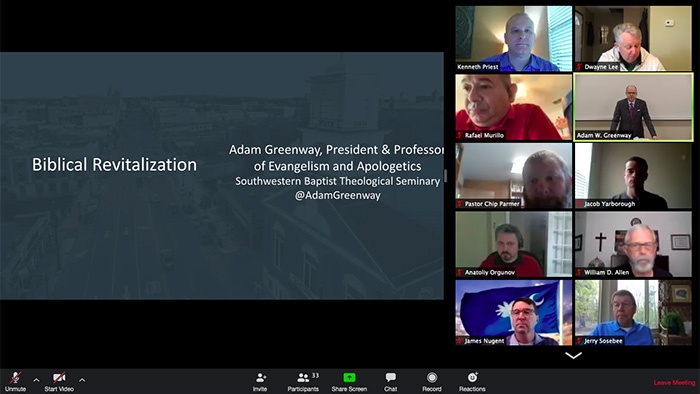 The conference featured multiple speakers with ties to SWBTS, including president Adam W. Greenway, who began the conference with a session titled “Biblical Revitalization.” Greenway traced the story of the church of Ephesus from Acts 20 to 1 and 2 Timothy and concluding in Revelation 2. The church’s story revealed its need for revitalization over time, Greenway said, which is “a word and reminder to us about the task of revitalization: it is a perennial one.”
The conference featured multiple speakers with ties to SWBTS, including president Adam W. Greenway, who began the conference with a session titled “Biblical Revitalization.” Greenway traced the story of the church of Ephesus from Acts 20 to 1 and 2 Timothy and concluding in Revelation 2. The church’s story revealed its need for revitalization over time, Greenway said, which is “a word and reminder to us about the task of revitalization: it is a perennial one.”
“It’s a perpetual ministry,” Greenway said. “A ministry of fidelity and faithfulness to the Gospel and to the Scriptures and to our Lord is a ministry of revitalization.”
Greenway asserted that, unless someone is called to plant a church, all ministers are ultimately called to church revitalization.
“The tendency [for churches] is always going to be to drift, to become distracted, dissuaded, diverted from the purpose and the plan,” Greenway explained. “That’s why you’re there, pastor. That’s why your ministry is so critical, because you’re the one who is standing in the gap, consistently and constantly calling your people back to what matters most, back to the first things, back to the Scriptures, back to the mission.”
Greenway added that revitalization is not only a biblical calling and a biblical paradigm, but it “represents the heart of what ought to characterize the pastor of the church for the long haul.”
“Our work,” he explained, “should be always that we are committed to doing what we can to help our churches, our people, those entrusted to our care, to be the kind of people who are found faithful — faithful in terms of their life and doctrine and beliefs; faithful in terms of their ministries and their work and their duties; keeping the main thing, the main thing; always centering ourselves around the Word of God and what matters most.
“That’s what I believe is a biblical paradigm for revitalization. That’s what I believe ought to characterize us.”
SWBTS graduate Matt Henslee, senior pastor at Mayhill Baptist Church in New Mexico, also spoke at the conference, covering the topic “The Sufficiency of Scripture in Church Revitalization.” He taught from 2 Timothy 3:16-4:5.
Henslee, a Doctor of Ministry student at SWBTS, noted the primary task for all church pastors: faithfully preaching the Word and faithfully reaching the lost. All of this, he explained, comes from a foundational belief that Scripture is sufficient in every aspect of the pastor’s calling and is what drives everything pastors do in the lives of their churches.
“We have to get after it,” Henslee said. “I have to get after it. Eternity is coming for all of us, and heaven and hell hang in the balance for all around us. So, before God and Christ Jesus, our righteous Judge, we are to preach the Word. We need to get it straight and give it straight. A faithful preacher or teacher will do nothing short of this.”
Next, conference attendees were asked to consider whether they should pursue doctoral studies while revitalizing a church. Speaking on this were Shane Parker, director of the Doctor of Educational Ministries program at Southwestern Seminary, and Coleman Ford, director of professional doctoral programs.
Opening their session, Parker asked the conference attendees, “Can you successfully revitalize your church without guidance and accountability?”
Parker explained that while these might be found elsewhere, one of the primary sources is a doctoral program. Reflecting on his own experiences in local church ministry, including two pastorates, he added, “Doctoral study really did provide exactly what I needed to be effective and more certain of what I was doing in revitalization.”
Ford outlined five reasons why a doctoral program at SWBTS might be beneficial for pastors revitalizing a church: “It connects you to a network of other like-minded ministry leaders; it trains you to become an expert practitioner in the area of church revitalization; church revitalization gives you a natural habitat or laboratory for your doctoral work; doctoral work is formative for you as a leader; and professional doctoral studies allow you to access mentors and coaches who have been part of revitalization efforts.”
To learn about SWBTS’ Doctor of Ministry in Church Revitalization, see here.
Following the discussion of doctoral program opportunities, Ken Hemphill, the seventh president of SWBTS who now serves as special assistant to the president at North Greenville University, spoke on practical ways that revitalization happens in the local church.
“There is an integral connection between local church health and Kingdom expansion,” Hemphill said. “There is a very real connection that if we are going to be involved in empowering Kingdom growth or expansion, then the local church health and thus revitalization is critical.”
Hemphill continued that his “absolute conviction” is that church growth is supernatural. He concluded that there are three essential steps in the process: a change of heart, a change in thinking, and ultimately a change in behavior.
Churches accomplish this in partnership with the Holy Spirit by basing everything on Scripture, being careful to distinguish between what is biblical and what is simply Baptist.
“A lot of what we cling to is more tradition-led than Bible-led,” Hemphill said. “We are not trying to please a denomination; we are trying to please the Lord.
“We have to maintain with our people, is this a biblical issue? Is this a biblical priority? And obviously, you have to keep the focus on the Great Commission.”
Matt Queen, L.R. Scarborough Chair of Evangelism, served as the conference’s penultimate speaker. Basing his presentation primarily on his book Mobilize to Evangelize: The Pastor and Congregational Evangelism (available from Seminary Hill Press here), Queen spoke on the topic “Assessing Your Church’s Evangelism for Revitalization.”
Queen built his presentation on two essential themes: first, “Outside the work and power of the Holy Spirit, a church’s pastor is the most influential factor upon its effectiveness in evangelism”; and second, “No church will exceed its pastor’s passion for and practice of evangelism. Likewise, no church will succeed in evangelism if its pastor fails to practice and have passion for evangelism.”
The primary takeaway, therefore, was for pastors to lead their churches in evangelism. Means of doing so include setting expectations (such as setting the goal for church members to share the Gospel once a month, once a week, or even once a day), and encouraging the use of guidelines for doing evangelism, Queen said. Among the guidelines Queen listed are the “homestead guideline,” which means sharing the Gospel with anyone who comes to an individual’s home (such as a salesperson, delivery man, or repairman), and the “five-minute guideline,” which means sharing with anyone with whom an individual has more than five minutes to speak (like on a flight, in a waiting room, or at a ball game).
“You can actually be effective in your evangelism without having to spend one more dollar, without having to build one more building, without having to hire one more staff person,” Queen concluded. “It just takes you being more intentional in your evangelism … by just making some little tweaks, looking at what you’re doing in evangelism, and then being intentional about it. It will make all the difference in you and in your church and in the Kingdom of God.”
Kenneth Priest, who, in addition to his role at SWBTS, serves as director of convention strategies for the Southern Baptists of Texas Convention, concluded the conference by addressing “Church Revitalization in the Midst of COVID.” Specifically, he spoke on what churches need to focus on “now, next, and beyond.”
Now, Priest said, churches must prioritize the ministry needs of church members and of the community, such as buying and delivering groceries for senior adults who cannot venture out of their homes. In addition, churches must make good use of technology for worship, small group and committee meetings, and online giving, Priest said.
Regarding “next,” Priest encouraged pastors to consider how they are going to “relaunch” their worship services.
“Just because we get the clearance to go back, to interact with people in person, and we start having worship services, we don’t need to just show up at worship on Sunday morning; we need to make an event out of this. You need to relaunch worship,” he said.
Similarly, Priest added, churches must “relaunch” their community engagement.
“As soon as you get the green light, you need to be in the community — knocking on doors, holding block parties, doing whatever you can to let the community know, ‘The church is here, we want to serve you, we’ve been praying for you, this is what we can do,'” Priest said. “… Don’t get comfortable with the fact that you’ve gone online. Make sure that you’re using this as an opportunity to reengage those who are out there in person.”
Finally, Priest covered “beyond,” encouraging pastors to learn from the past and ensure financial reserves are well established.
“The next time that the grass is green and the wheat is growing, we need to build up some reserves,” he said. “We need to ensure that we have enough reserves so that once we reestablish our ministry, if we have a crisis that comes again, we’re prepared for it.”
Priest specifically recommended having four to six months of reserves for fixed expenses.
“God teaches us to be wise stewards,” he said. “We need to store up for the rainy day and make sure that we’re prepared for those times.”
Other speakers at the day-long event included Bob Bickford, lead pastor of the Groves Church in St. Louis, Missouri; James Womack, senior pastor of Destiny Church in Fort Worth; and Kyle Bueermann, senior pastor of the First Baptist Church in Alamagordo, New Mexico.
To view each of the Revitalization Conference sessions, see here.
